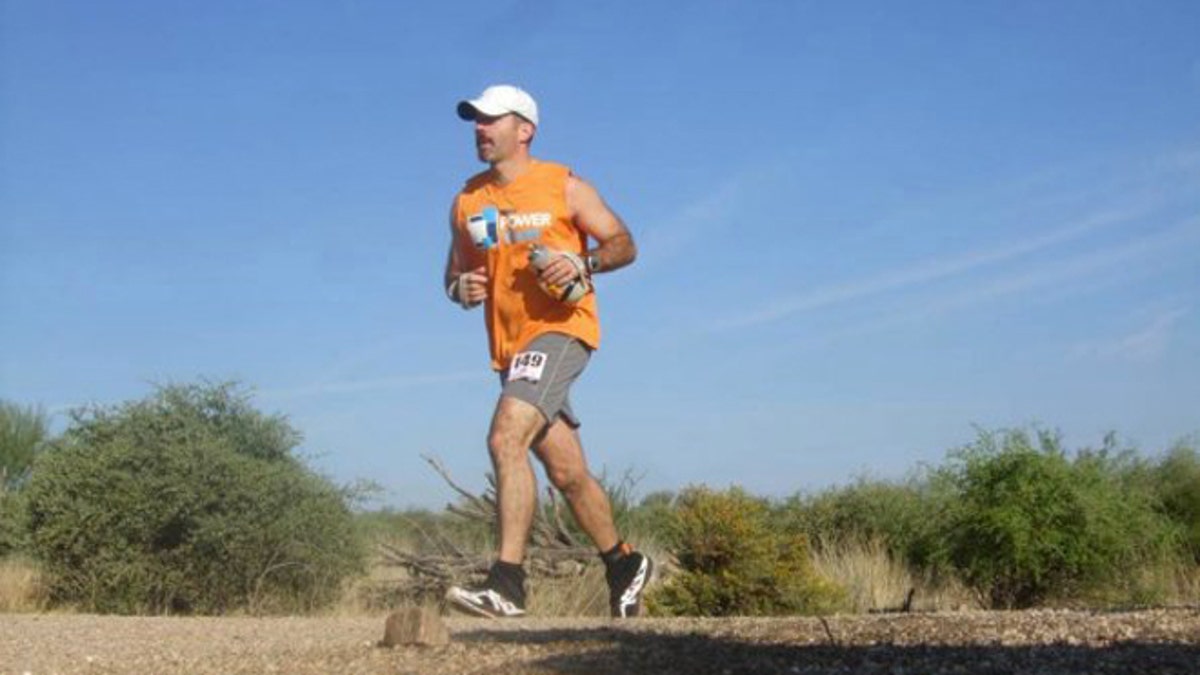
Eric Gelber, 46, wearing his signature MMRF Power Team t-shirt, trains for his first Super Ultra run; the 'Catskill 155: Journey for a Cure' in August 2011. COURTESY: Multiple Myeloma Research Foundation
Many joggers in NYC run around the Central Park’s reservoir, a 1.5 mile loop, more ambitious runners tackle the 6-mile loop around the entire park. But imagine running the park for 48 hours straight?
Eric Gelber plans to do just that. Gelber, a 46-year-old ultramarathon runner has pledged to run that loop around Central Park 33 times, or about 200 miles.
Since, 2007, Gelber has run 20 ultramarathons, defined as any race longer than a 26.2 mile marathon. The longest run so far was a solo charity 155-mile run through the Catskills in New York.
“Every time I run farther, people seem willing to donate more money,” said Gelber, whose runs raise money for the Multiple Myeloma Research Foundation. Gelber began running for the cause because a close family friend was diagnosed with multiple myeloma, a type of blood cancer, and he wanted to do something to help. He has raised about $175K to date.
But why ultras? It started with a challenge. Gelber had run one marathon in 2001, but then pretty much lost interest. Five years later, he was inspired by Dean Karnazes, who ran 50 marathons in 50 states in 50 days.
“I said, ‘if he can do 26 miles a day, I can do 5,’” said Gelber.
A year later, he ran in the NYC marathon, and raised $10K for the MMRF, and that inspired him to raise more money. Then came the challenge. A co-worker told him about a 50K (31 mile) ultramarathon, and he said, “If you do it, I’ll do it.” On the day of the race, Gelber showed up, but the co-worker didn’t.
“It was the hardest thing physically and mentally I had ever done,” he said. “But as soon as I got done, I couldn’t wait to try something a little harder.”
Training for an ultra has one main difference from marathon training—more time on your feet. For marathons, you may do one long 18 to 20 mile run a week, three or four times before the race.
“For an ultra, I’ll run 6 to 8 hours on a Saturday, about 25-30 miles, and then 5-6 hours the next day,” he said.
Gelber typically gets up at 3 a.m. to start these long weekend runs, so he has time for his family—he has three children and works full time in real estate.
During the run, his team focuses on issues like nutrition and staying hydrated. They give him a variety of supplements (powders, gels mixed in water and Vita Coco Coconut Water) to maintain a consistent calorie intake of 250-300 per hour. His fluid intake is approximately 30 ounces per hour, depending on the temperature.
“When I am done, I will eat and drink everything in sight,” he said. But sleep may be his biggest issue. “You can literally fall asleep on your feet,” said Gelber. If he feels himself at that point, he’ll likely take a few 10-minute naps in a chair throughout the 48 hours. Other issues can arise: delirium, hallucinating and perhaps the worst are the blisters, which can cover the entire ball of his foot.
Gelber uses a range of tactics to keep going hour after hour, but often he just zones out and runs for long periods of time without thinking much of anything. That may not be possible in the Central Park run. He has invited runners to join him when they can (for a donation of $100), so he may need to keep his mind “on” the entire run. “It’ll be exciting to have people to run with, especially when I’m struggling,” he said. “I hope they come with lots of stories and jokes to keep my spirits up,” he said.
He’ll also have his 10-person crew, with his wife, Tani, at the helm, who has led the teams through each one of his ultras.
But research has shown that exercising for several hours at a time can tax your heart to the point that it overstretches the heart’s chambers and causes microtears.
“If you do this over and over again, the chamber starts getting scarred and thickening,” said Dr. James O’Keefe, a sports cardiologist at the University of Missouri, Kansas City.” Exercising also produces harmful free radicals, and while our bodies are equipped to dispose of them, we outstrip our natural supply if we keep going for more than about an hour. The bottom line is chronic excessive ultra-endurance exercise probably prematurely ages the heart.”
Gelber is not too worried about the toll the ultras may be taking on his body. So far, nothing too serious has happened and he’s in the best shape of his life. “If I am limping around in 10 years and there is a cure for cancer, it will all be worth it,” he said.
For more information, check out Gelber's "48 Hours in the Park" donation website here.
